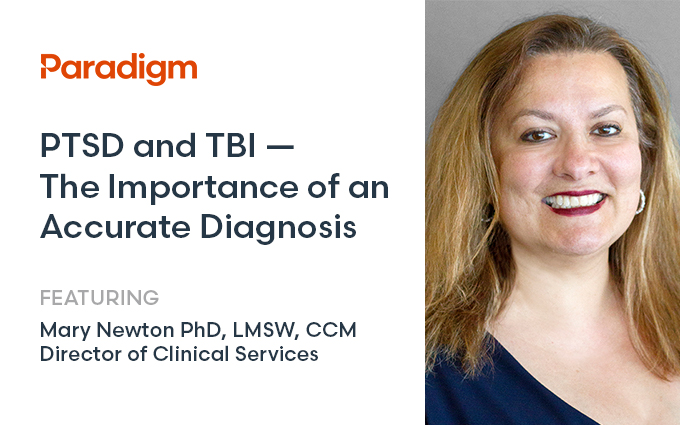06/10/2021

Catastrophically injured workers deal with devastating physical injuries, but there are also behavioral and mental health concerns that require attention. Unaddressed behavioral health problems can lead to significant barriers to recovery and return to work, which is why it is crucial to identify and treat issues at the earliest possible point in the phase of care.
Due to the nature of workplace injuries, a particularly common condition in catastrophic cases is post-traumatic stress disorder (PTSD).
With June being PTSD Awareness Month, Paradigm is bringing increased attention to the need for the accurate diagnosis of this disorder among injured individuals. While effective PTSD treatment requires this, one factor that can increase the risk of misdiagnosis is the presence of either a mild traumatic brain injury (mTBI) or a traumatic brain injury (TBI).
Paradigm Director of Clinical Services, Mary Newton, PhD, LMSW, CCM, has been studying and presenting on this topic for years. At the upcoming Brain Injury Association of Michigan’s Fall Conference, Dr. Newton will be presenting “TBI & PTSD, the Overlap, the Differences, and the Importance of Making the Correct Diagnosis.”
In a recent conversation, Dr. Newton shared that, for injured workers dealing with PTSD, TBI, or both, positive outcomes depend on a treatment plan that correctly identifies any warning signs as early as possible.
Shared symptoms create challenges
According to Dr. Newton, she and other researchers began to see misdiagnosed PTSD among soldiers returning from service in the early 2000s. “Earlier in my career, I worked with the VA helping soldiers who were returning home from the war in Iraq,” she explained. “Many of these soldiers had been diagnosed with PTSD after reporting sleep disturbances, depression, and anxiety. But some weren’t responding to standard PTSD treatment, and there was often a highly negative impact on their lives after one to two years.”
Further study of this issue would reveal that a large number of these patients had experienced an mTBI, such as a concussion, which was a field of study that the VA was just beginning to understand. “The reason the diagnosis was missed is that, while moderate to severe TBI symptoms are generally distinct, many mTBI symptoms overlap with symptoms of PTSD,” Dr. Newton said. “These include cognitive deficits, insomnia, depression, fatigue, and anxiety; and so it can be difficult to differentially diagnose the two conditions.”
According to Dr. Newton, time is of the essence when it comes to a TBI diagnosis: “With brain injury rehabilitation, the first year post-injury is absolutely critical. Many of the restorative functions and neuroplasticity that return the brain to working order happen during this time,” she said. “So if you’re identifying TBI a year-and-a-half later due to misdiagnosis, you’ve missed a critical window of opportunity for treatment.”
Different treatment needs
As a group with high exposure to both PTSD and TBI, catastrophically injured workers benefit from an enhanced approach to diagnosis and treatment of these two distinct, yet sometimes coexisting conditions. Dr. Newton highlights the need for dedicated training to properly distinguish potential TBI versus PTSD symptoms. A misdiagnosis in either direction can lead to elevated risk factors for negative outcomes in return to work, relationships, and overall psychosocial health.
Although some symptoms often overlap, the treatment needs for moderate to severe TBI and PTSD are very different, according to Dr. Newton. “Taking the symptom of irritability as just one example, PTSD involves primarily psychological treatment, whereas irritability due to TBI responds favorably to behavior modification and other cognitive therapies,” she says.
Dr. Newton emphasizes the importance of the extensive resources Paradigm has in place to identify and treat mTBI, as well as behavioral health concerns such as PTSD. “Under the guidance of Paradigm Associate Vice President of Clinical Services, Dr. Deborah Benson, and Paradigm Medical Director, Dr. Elizabeth Sandel, Paradigm developed evidence-based management guidelines for mTBI. The goal was to develop standardized criteria to facilitate the identification of injured workers with mTBI and delivery of the appropriate level of care,” she said. “We want to ensure that during that critical first year, injured workers have the support and treatment needed to return to optimal functioning.”
On the PTSD front, Dr. Newton also underscored the in-depth training that Paradigm Network Managers and Medical Directors undergo, and the resources available, both internally and externally, to address mental health support: “We have a wealth of resources for training and ongoing education on the different manifestations of PTSD and how it’s related to catastrophic workplace injuries.” Dr. Newton continued, “We have designated medical and behavioral health specialists available to our management teams to help support and guide our injured workers and families around psychosocial adjustment challenges. We also have strong provider relationships to ensure access to mental health service providers, including PTSD specialists across the country that adopt evidence-based practice approaches.”
Raising awareness and improving outcomes
Throughout the month of June, Paradigm will be raising awareness for PTSD across our corporate social media channels. You can help by liking, commenting, and sharing our posts.
Learn more about moderate to severe TBI and Paradigm’s proactive approach to catastrophic care management in a recent webinar featuring Drs. Benson and Sandel.